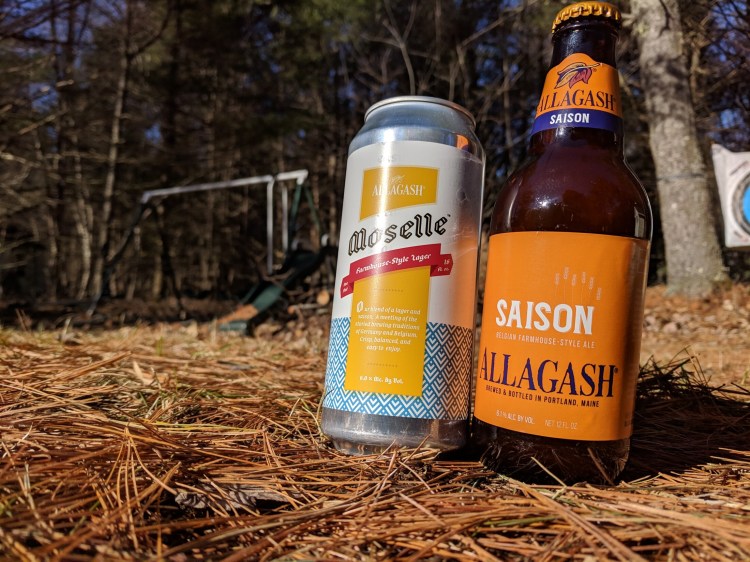Spring is fickle in Maine. It can be anything from sunny to snowing but is best defined as mud season, when the frozen ground transitions into an unsatiable and insidious trap for shoes and car tires. Thankfully, this is also when the soil starts to become plantable and workable for gardening and farming.
There are two spring beer styles, traditionally. One, the bock style, originates from the German tradition of brewing malt-forward beers for Lent and spring festivities. The other has French and Belgian origins and has much more to do with the work of farming.
Imagine you ran a large farm in the rural areas of Belgium. What did you do when your farm was a having slowdown or it was too cold for crops? Historically, the answer was make beer. This beer would be stored in the farmhouse and taken out in the spring. While “saison” translates to “season” in this context, it refers to “les saisonnaires,” the seasonal workers who got to enjoy this brew when they were brought on in the spring. Because of its farm-based origins, they are also referred to as farmhouse ales.
A modern saison is typically dry, light-bodied and pale colored, and is unfiltered and slightly cloudy (but not nearly as opaque as hopped hazy IPAs). With the saison, it isn’t the hops that take center stage, but often the spices that are added during the brew. These can include coriander, citrus peel, grains of paradise, black pepper or star anise. The flavor profile of a Belgian-style saison today differs from the first batches, which were spiced with whatever was available locally. Each farm might have a distinct recipe, and it might have changed from year to year, depending on the available ingredients.
If you want to explore the ways that modern brewers have recreated (and invented) versions of saisons and farmhouse ales, there are two excellent breweries to check out. Oxbow Brewing Co. began brewing in Newcastle in a farm brewery space and has now expanded to two additional locations, with a tasting room in Portland and a newly opened Oxbow Beer Garden in Oxford. Whether you choose the more rural or urban locations, you’ll find a variety of excellent beer, many of which are riffs on the saison.
I recommend starting with the Farmhouse Pale Ale (the flagship beer) to get a taste of Oxbow’s house yeast and its philosophy on farmhouse styles. From there, you can branch out. There are beers such as Crossfade that use a different yeast, Brettanomyces, to bring out different flavors. Others, like the Barrel-Aged Farmhouse Pale Ale, use the flavors of barrel-aging to enhance the flavors present. In addition to beer on tap, each Oxbow location has a hearty selection of bottles, so if you’re curious about saisons, it is a great place to spend an afternoon exploring the extent of how the brewery plays with the style.
While Allagash is best known nationally for White, a Belgian wheat beer, it’s been making a variety of saisons for some time. Recently, a few new releases have caught my eye. Its quintessential saison, simply named Saison, is a great introduction to the style. It has all the traditional saison notes – there’s a little bit of pepper and citrus, with that yeast flavor coming through both in the aroma and the taste. Like Oxbow, you can get a sense of Allagash’s house yeast flavor in this one, so it makes for an interesting starting point before moving on to the more experimental and wild variations.
One of the more interesting variants I’ve tried is a new beer named Moselle. Described as a “farmhouse-style lager,” the beer tastes like nothing I’ve ever come across. Brewed as a limited release for Saison Day earlier this month, Moselle is the combination of two different beers that were brewed separately and then blended together. One is brewed with lager yeast, the other with saison yeast. When combined, the effect is not a clashing of flavors, but an added layer of complexity. It has all of the crispness and freshness of a lager, but all of the depth and a little of the sweetness coming from the saison side, finishing with a peppery note. Cans of this are still available in the Allagash tasting room in Portland, so if you are interested in trying this, I wouldn’t sleep on it.
Thanks to modern refrigeration, saisons can be brewed year-round and don’t have to be squirreled away in a barn to mature. Spring, however, is a great time to break out these beers if you want to get a little glimpse into beer (and farming) history.
Carla Jean Lauter is a freelance beer writer and blogger who lives in Lisbon. Follow her beer adventures at:
Twitter: beerbabe
Send questions/comments to the editors.



Success. Please wait for the page to reload. If the page does not reload within 5 seconds, please refresh the page.
Enter your email and password to access comments.
Hi, to comment on stories you must . This profile is in addition to your subscription and website login.
Already have a commenting profile? .
Invalid username/password.
Please check your email to confirm and complete your registration.
Only subscribers are eligible to post comments. Please subscribe or login first for digital access. Here’s why.
Use the form below to reset your password. When you've submitted your account email, we will send an email with a reset code.